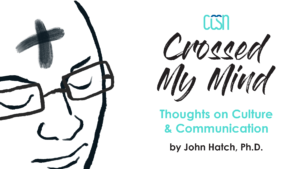 Column title: Crossed My Mind: Thoughts on Culture and Communication
Column title: Crossed My Mind: Thoughts on Culture and Communication
Column entry: “Baucham’s Fault(y) Lines: Wrongly Dividing the Body of Christ”
By John Hatch, Ph.D.
Eastern University (retired)
CCSN Senior Fellow
Column Description: As Christians, we are called to have the mind of Christ. This goes against the grain of our social and cultural conditioning. We seek personal or political advancement; Christ seeks the lost and the least. We grasp for cultural ascendency; Christ descends to the cross of love. This column is dedicated to thinking about culture and communication under the sign of the cross.
November 2023 / October 2023 / July 2023 / June 2023 / May 2023 / April 2023 / March 2023 / February 2023 / January 2023 / December 2022 / November(2) 2022 / November 2022 / October 2022 / August-September 2022 / June-July 2022 / January 2022 / December 2021 / October-November 2021
November 2023
Baucham’s Fault(y) Lines: Wrongly Dividing the Body of Christ
(Part 2 in a series)
My previous column launched a brief series on Voddie Baucham’s bestselling book about race and the Church, Fault Lines: The Social Justice Movement and Evangelicalism’s Looming Catastrophe. I argued that the book should be taken seriously—and read with a critical eye. I then highlighted Baucham’s potentially positive contributions to Christian discourse about race and social justice, including his personal story and his critiques of simplistic claims about race and racism.
In this column, I’d like to begin by imagining how Baucham could have framed his story and critiques in such a way as to promote the discernment, edification, and unity of the Church. This will help us more clearly see what is problematic about his approach.
Firstly, to white Christian readers anxious to fight racism and elevate black voices, Baucham could have warned against undiscerning embrace of the social justice movement. For instance, he could have cautioned against assuming that there is a uniform black perspective on race, or that people of color share a monolithic experience of marginalization within predominantly white churches. At the same time, Baucham could have balanced these warnings with acknowledgments that many black evangelicals have experienced being marginalized or dismissed in majority-white churches when they’ve attempted to voice concerns about racial issues. (For instance, New Testament scholar Dennis Edwards shares troubling stories from his experience as a black associate pastor at a predominantly white church.)[i]
Likewise, Baucham could have taken the opportunity to acknowledge not only how Critical Race Theory falls short of gospel truth, but also how colorblindness and American triumphalism tend to ignore or overlook the reality of racism’s legacy in sociological, socioeconomic, cultural, and psychological patterns that persist generations after the civil rights movement. He could have shown how biblical understandings of justice go deeper and broader than the individualistic focus that dominates mainstream American evangelical thinking, while Scripture also holds individuals accountable in a way that contemporary social justice movements often fail to do.
In short, like George Yancey, Baucham could have avoided playing into the conservative-vs.-liberal divide, showing instead that Scripture exceeds and challenges popular understandings on both sides. Like Frederick Buechner,[ii] Baucham could have highlighted the fullness and messiness of Truth, with eludes our neat boxes. Instead of merely pitting “biblical justice” (as little more than a buzzword) against what he calls “Critical Social Justice,”[iii] he could have taken the opportunity to briefly unpack Scripture’s especial concern for the poor and vulnerable, its recognition of collective and multi-generational sin, and the Torah’s call for structural remedies to poverty (as Tim Keller does on a fuller scale in Generous Justice).[iv]
But alas, Baucham took a much different tack, adopting a simplistic and polarizing frame that positions theological and political ultra-conservatives on the side of Truth and anyone slightly less conservative on the side of Error. Using the San Andreas Fault as a metaphor, he argues that evangelical Christianity faces a “looming catastrophe” that cannot be prevented, because the gospel is under attack by the encroachment of “Critical Social Justice” in the mouths of leaders who should know better. In fact, Baucham seems to embrace the notion that the Church is being riven by an irreconcilable divide: “I am not writing this book to stop the divide. I am writing to clearly identify the two sides of the fault line and to urge the reader to choose wisely.”[v]
If those on right side of the divide include “people like John MacArthur, Tom Ascol, Owen Strachan, Douglas Wilson, and the late R. C. Sproul,”[vi] who is on the wrong side? Which Christian leaders, in Baucham’s mind, are tantamount to stooges of anti-gospel deception? It may shock some readers to learn that his list of suspects includes the likes of Tim Keller, Russell Moore, David Platt, Thabiti Anyabwile, and leaders in such organizations as “the Southern Baptist Convention, the Ethics and Religious Liberty Commission, 9Marks, the Gospel Coalition, and Together for the Gospel (T4G).”[vii]
As I noted in the first installment of this column series, Baucham is a rhetorically sophisticated writer. He knows how to use caveats and personal language to come across as reasonable, humble, and open-minded. For example, he asserts: “I am not at war with the men, women, and ministries I have named in this book. I love them. Some of them are actually long-time personal friends. But I am at war with the ideology with which they have identified to one degree or another.”[viii] After arguing that pastor John Onwuchekwa “impugned the sufficiency of Scripture” by suggesting that the Bible would not make sense to some modern readers without the evidence of archeology, Baucham states, “I hope John O.’s statements were the result of a momentary lapse. If not, his understanding of the Bible is heretical.”[ix] Faulting David Platt for doing bad exegesis while preaching on Amos 5 (in using the passage as a springboard for racial repentance), Baucham concedes that “Platt loves Jesus, loves people, and is passionate about reconciliation. I know this because I know and love David Platt. I also know he started reading and being influenced by the woke canon.”[x]
Despite such expressions of friendship and love, Baucham demonstrates little grace or goodwill when representing the words of those with whom he disagrees. His zeal to make war with “Critical Social Justice” leads him to read their statements concerning race, justice, or Scripture uncharitably, with little consideration for intention or context. Baucham has an axe to grind, and he’s determined to grind it. As he says on p. 132, “We are right to pursue justice, peace, and unity . . . That is not the fault line. The fault lies in believing that such a vision can be attained by affiliating with, using the terminology of, or doing anything other than opposing in the most forceful terms the ideology that lies at the root of the social justice movement.”[xi] That ideology, as he represents it, is certainly at odds (and at war) with Christian faith. The problem is that (1) these leaders do not identify with such an ideology, (2) his presentation of their words tends to ignore context that would make this clear, and (3) his representation of Critical Race Theory is caricaturized to appear as anti-biblical as possible. In other words, he seems to favor the agonism of dualistic thinking (the knowledge of good and evil) over the value of truth in love.
Since the book’s master metaphor—the seismic fault line and resulting inevitable catastrophe in the evangelical church—is premised on this kind oversimplification and distortion, I believe Fault Lines does more to sow division than to promote gospel truth or biblical justice. In effect, Baucham’s book is not an invitation to social-justice Christians to be more discerning, or to listen more carefully in dialogue with their conservative peers; rather, it functions as a polemic for the benefit of those already inclined to dismiss the idea of systemic racism—or overwhelmed by the debate and wishing for a simple answer.
I don’t expect readers to accept this critique without supporting evidence. Thus, my next column will further unpack how Baucham presents the fault line in the Church and the words and efforts of Christian leaders whom he deems to be on the wrong side of it.
* The views of any CCSN columnists are their own, and do not necessarily represent the views of the CCSN. We invite and embrace a wide range of views and critiques on important communication and cultural issues from a Christian perspective. The CCSN is a community of Jesus followers who study communication. We do not support or promote a particular social, political, or denominational agenda.
Notes
[i] Dennis R. Edwards, Might from the Margins: The Gospel’s Power to Turn the Tables on Injustice (Harrisonburg, VA: Herald Press, 2020).
[ii] See John Hatch, “Frederick Buechner and Telling the Truth, Crossed My Mind, CCSN, October 16, 2022, https://www.theccsn.com/column-entry-frederick-buechner-and-telling-the-truth-by-john-hatch/.
[iii] Voddie T. Baucham Jr., Fault Lines: The Social Justice Movement and Evangelicalism’s Looming (Washington, DC: Salem Books, 2021), xii.
[iv] Timothy Keller, Generous Justice: How God’s Grace Makes Us Just (New York, Penguin Books, 2010). See also Chris Marshall, The Little Book of Biblical Justice: A Fresh Approach to the Bible’s Teachings on Justice (New York: Good Books, 2005).
[v] Baucham, Fault Lines, 7.
[vi] Baucham, Fault Lines, 2.
[vii] Ibid.
[viii] Baucham, Fault Lines, 210.
[ix] Baucham, Fault Lines, 121.
[x] Baucham, Fault Lines, 123.
[xi] Baucham, Fault Lines, 132.

